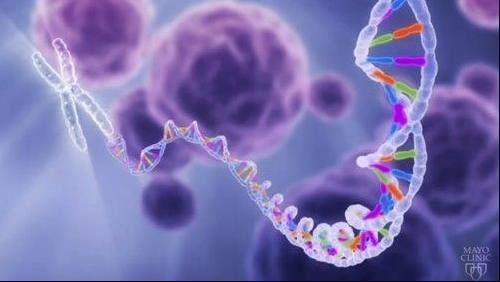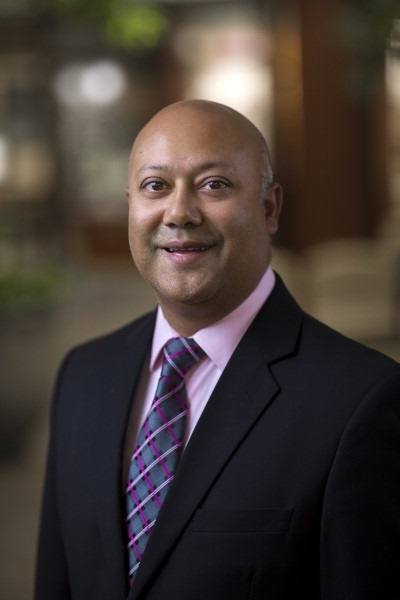-
News Releases
Mayo Clinic study finds 1 in 8 patients with cancer harbor inherited genetic mutations

PHOENIX, Ariz. ― Genetic testing can uncover inherited genetic mutations, and could individualize cancer therapies, improve survival, manage cancer in loved ones and push the boundaries of precision medicine.
In a new study published in JAMA Oncology, scientists with Mayo Clinic's Center for Individualized Medicine conducted genetic testing in more than 3,000 patients who were diagnosed with cancer at Mayo Clinic Cancer Center locations in Arizona, Florida and Minnesota. In all, the scientists found that 1 in 8 patients with cancer had an inherited cancer-related gene mutation. This mutation would not have been detected in half of these patients using a standard guideline-based approach.
"We found that 13.5% of patients had an inherited mutation in a gene associated with the development of their cancer," says Niloy Jewel Samadder, M.D., a Mayo Clinic gastroenterologist and hepatologist, who is the study's author. "Everyone has some risk of developing cancer, and in most cases the disease develops by chance. However, some people are genetically predisposed to developing certain types of cancer, such as breast or colon cancers."
A genetic mutation can cause a gene to malfunction and lead to a cell becoming cancerous. Although many mutations that cause cancer happen by chance in a single cell, the study confirms that nearly 10%–25% are inherited mutations that set off a cycle of events that can lead to cancer.

Dr. Samadder says uncovering these hidden inherited genetic mutations could lead to opportunities for cancer management in families and targeted cancer therapies that can save lives.
In the two-year Interrogating Cancer Etiology Using Proactive Genetic Testing (INTERCEPT) study, Mayo Clinic provided free genetic testing and counseling to 3,084 Mayo Clinic patients as part of their standard cancer care. The project, representing the largest known multicenter study of universal testing of patients with cancer, included a broad mix of cancer stages and types, including breast, colorectal, lung, ovarian, pancreatic, bladder, prostate and endometrial cancers.
The researchers were surprised to find that the standard guidelines physicians relied on to determine which patients with cancer should undergo genetic testing were only able to identify 48% of the patients with an inherited genetic mutation.
Watch: Dr. Samadder discusses the research findings.
Journalists: Broadcast-quality video sound bites with Dr. Samadder are in downloads at the end of the post. Please "Jewel Samadder, M.D. / Gastroenterology and Hepatology / Mayo Clinic"
"More than half of the patients who developed cancer due to inherited mutations were being missed, and that has major implications for family members," Dr. Samadder says.
"Everyone has some risk of developing cancer, and in most cases the disease develops by chance. However, some people are genetically predisposed to developing certain types of cancer, such as breast or colon cancers." - Dr. Samadder
During the study, when the researchers examined the effects of a genetic mutation discovery, they found that one-third of the patients with the highest-risk cancer genes had a change in their medical management, including the type of surgery or chemotherapy they received.
"This targeted treatment would have been lost if the patients had not received genetic testing," Dr. Samadder emphasizes.
"Genetic testing is underutilized in cancer care, both for patients and for their families, often due to outdated guidelines that restrict testing to a narrow group of high-risk patients," says Robert Nussbaum, M.D., chief medical officer of Invitae Corporation. "All cancer patients should have access to complete genetic information that can guide their care and inform their families' health." Dr. Nussbaum was a contributing author on the study.
Sharing genetic risks with family members
Dr. Samadder says equally important to the discovery of a patient's inherited cancer mutation is the potential for patients to share the heretible-cause of their disease with their relatives, allowing family members to pursue care for earlier disease detection and cancer management.
"We can help prevent cancer in their loved ones because it is genetic, and they share these cancer-causing genetic changes with their children, siblings and others in their families," Dr. Samadder explains. "We can target prevention strategies for those high-risk individuals and hopefully prevent cancer altogether in future generations of their family."
All blood-related family members of patients found to have a genetic mutation were offered free genetic testing. Overall, 1 in 5 of these family members underwent testing. The next steps will be to incorporate the study findings into the care of all patients with cancer at Mayo Clinic.
"Steps are being taken to ensure all patients are offered genomic sequencing to better understand the genes that led to the development of their cancer, and how to precisely target treatment and improve survival," Dr. Samadder says.
Genetic sequencing, deletion and duplication analysis, and variant interpretation was performed at Invitae Corporation in San Francisco. Support for this project was provided by the Mayo Transform the Practice Grant, Mayo Clinic's Center for Individualized Medicine, Desert Mountain Members' CARE Foundation, the David and Twila Woods Foundation, and a Faculty Career Development Award from the Gerstner Foundation (NJS).
Dr. Samadder presented his study at the American Society of Human Genetics on Oct. 30, 2020.
###
About Invitae
Invitae Corporation (NVTA) is a leading medical genetics company whose mission is to bring comprehensive genetic information into mainstream medicine to improve health care for billions of people. Invitae's goal is to aggregate the world's genetic tests into a single service with higher quality, faster turnaround time and lower prices. For more information, visit the Invitae Corporation website.
About Mayo Clinic
Mayo Clinic is a nonprofit organization committed to innovation in clinical practice, education and research, and providing compassion, expertise and answers to everyone who needs healing. Visit the Mayo Clinic News Network for additional Mayo Clinic news and Mayo Clinic Facts for more information about Mayo.
Media contacts:
- Susan Murphy, Mayo Clinic Public Affairs, newsbureau@mayo.edu
- Sarah Anderson, Invitae, pr@invitae.com







